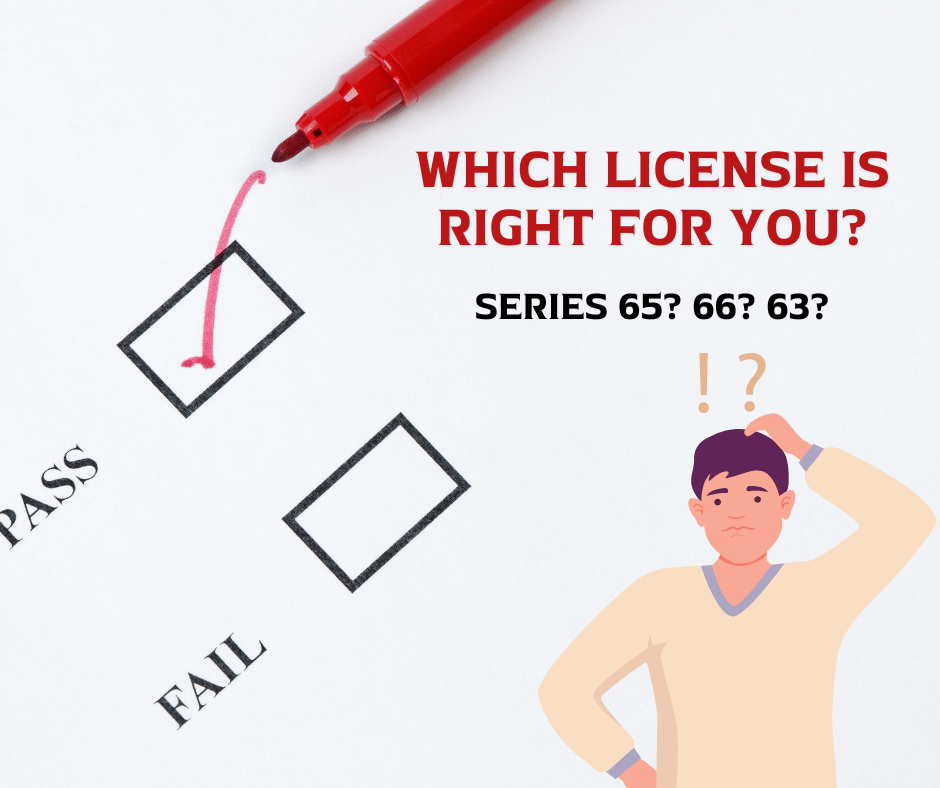Series 66 vs Series 63 vs Series 65: Which License Is Right for You?

“Which securities license should I pursue?”
It’s the million-dollar question for anyone entering the financial advisory space, and the confusion between Series 66, Series 63, and Series 65 exams is understandable. These licenses might sound similar, but they open different doors in your financial career.
The path you choose will impact what you can do professionally, who you can serve, and how you’ll make your living in the financial services industry. Making the right choice now can save you time, money, and frustration down the road.
Understanding Each License: What They Allow You to Do
Series 63: For Securities Sales
The Series 63 is required for individuals who work as securities agents, meaning they can sell securities to clients. This exam focuses on state-level compliance and the Uniform Securities Act.
Think of the Series 63 as your ticket to executing transactions and selling investment products to clients. It’s often referred to as the “blue sky” license because it deals with state securities laws (which were historically called “blue sky laws”).
No prerequisites are required, though most take it alongside the Series 7. You’ll need sponsorship by a FINRA member firm or self-regulatory organization.
Series 65: For Investment Advice
The Series 65 qualifies individuals to be investment adviser representatives (IARs), allowing them to provide investment advice and manage client portfolios for a fee. It covers topics like fiduciary duty, financial planning, and regulatory compliance.
This is the license you need if you want to provide investment advice and charge fees for your services. It’s particularly important for those looking to work at an RIA (Registered Investment Adviser) firm.
There are no prerequisites, and you can take it without firm sponsorship—making it ideal for those looking to start their own RIA or join an existing one as an independent adviser.
Series 66: The Combination Option
The Series 66 combines elements of both the Series 63 and Series 65, allowing you to be both a securities agent and an IAR. The catch? You must pass the Series 7 exam first or be concurrently qualified for it.
The Series 66 plus Series 7 combination gives you the broadest range of capabilities, allowing you to both sell securities and provide investment advice. This requires sponsorship from a FINRA member firm and is not available as a standalone option.
Exam Content and Difficulty Comparison
Wondering about Series 65 vs Series 66 difficulty? Here’s what to expect:
Series 63 Exam
- Number of questions: 60 multiple-choice questions
- Time limit: 75 minutes
- Passing score: 72% (43 correct answers)
- Content focus: State securities regulations, ethical practices, fiduciary obligations
- Difficulty level: Generally considered the least difficult of the three
Series 65 Exam
- Number of questions: 130 multiple-choice questions
- Time limit: 180 minutes
- Passing score: 70% (91 correct answers)
- Content focus: Economic factors, investment vehicle characteristics, client investment recommendations, fiduciary obligations, ethics
- Difficulty level: Moderate to difficult, requires more in-depth knowledge
Series 66 Exam
- Number of questions: 100 multiple-choice questions
- Time limit: 150 minutes
- Passing score: 73% (73 correct answers)
- Content focus: Combines elements of Series 63 and Series 65, but excludes redundancies
- Difficulty level: Similar to Series 65, but requires less study time if you’ve already passed Series 7
Making Your Choice: Which License Fits Your Goals?
The license you choose should align with your career aspirations and business model:
Choose Series 63 if: You primarily want to sell securities products and work for a broker-dealer. This license is appropriate if you don’t plan to provide fee-based investment advice and are taking it alongside the Series 7.
Choose Series 65 if: You want to provide investment advice for a fee and are looking to work at or start an RIA. This license allows you to operate as a fiduciary. Most advisers go this route as it’s the most straightforward path to providing investment advice without the complications of also obtaining the Series 7.
Choose Series 66 (+ Series 7) if: You want the flexibility to both sell securities AND provide investment advice, or already have your Series 7 license. This combination is ideal if you’re working for a firm that requires both capabilities or want the broadest range of capabilities in your role.
Preparation and Passing: Setting Yourself Up for Success
No matter which exam you choose, proper preparation is key to passing on your first attempt.
Effective Study Strategies
Most successful candidates begin studying 4-6 weeks before their exam date. Utilize dedicated study materials designed specifically for your chosen exam – generic financial materials won’t prepare you for the specific regulatory content these exams cover.
Practice exams are particularly valuable. They help you identify knowledge gaps and get comfortable with the question format. Plan to take several full-length practice tests under timed conditions before your actual exam.
After You Pass: The Next Chapter
Your real work begins after you pass your exam:
For Series 63 License Holders – Register with each state where you plan to conduct securities business and complete the required continuing education. The Series 63 is only the beginning – most professionals pair it with other licenses to expand their service offerings.
For Series 65 License Holders – Register as an IAR with the appropriate states. If starting your own RIA, you’ll need to navigate the RIA registration process and implement a compliance program.
For Series 66 License Holders – Register for both broker-dealer and advisory activities, understanding the different standards of care that apply to each role. You’ll need to be particularly careful about documenting when you’re acting in each capacity, as different obligations apply.
Compliance: Your Ongoing Responsibility
The securities industry is heavily regulated, and maintaining compliance isn’t a one-time event but an ongoing commitment. Staying current with regulatory changes is essential for your practice and the protection of your clients.
Many advisors find that working with a Securities Lawyer helps them navigate complex regulatory matters. Others find that Outsourced Compliance solutions provide the most cost-effective way to ensure they’re meeting all requirements without diverting focus from their clients.
Professional Development: Beyond the License
Your license is just the entry ticket – ongoing education is what will truly differentiate you in this competitive field. The most successful advisors continually expand their knowledge through:
- Advanced certifications like CFP®, CFA, or ChFC
- Specialized training in niche areas like retirement planning or ESG investing
- Regular updates on regulatory changes and market developments
For ongoing education and compliance support, our Compliance University offers resources to help you thrive throughout your career, not just pass your initial exam.
Your Next Steps Forward
Remember that whichever path you choose, success comes not just from passing an exam, but from building a practice that serves clients well while maintaining regulatory compliance.
Whichever path you choose, My RIA Lawyer is here to support your journey from licensing guidance through the growth of your practice.
